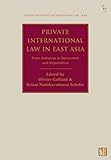Private international law in East Asia : from imitation to innovation and exportation / edited by Olivier Gaillard & Krista Nadakavukaren Schefer.
Series: Studies in private international law. Asia ; ; v. 9.Publisher: Oxford : Hart Publishing, 2024Description: x, 205 pages ; 25 cmContent type:- text
- unmediated
- volume
- 150997010X
- 9781509970100
| Item type | Current library | Status | Barcode | |
|---|---|---|---|---|
 Open Access Books - Publishers
Open Access Books - Publishers
|
National Law School | Available | OABP666 |
Includes bibliographical references and index.
This open access book examines the conflict of law rules in East Asian states. With a focus on the laws in Mainland China, Japan and South Korea, the book also looks at the rules of Hong Kong and Taiwan. Beyond a description of the substance of the current law, the book highlights the evolution these jurisdictions have undergone since being adopters of rules developed in European and North American legal systems. As evidenced by recent modernisations in their private law regimes, these East Asian states are now innovators, creating rules that are more suited to the local concerns. Significantly, the new approaches to private international law taken by China and Japan are themselves being adopted by other jurisdictions, shifting the locus of influence in this important area of law. The chapters in Part 1 give a contextual overview of the legal regimes of Mainland China, Japan, and South Korea. This part is intended to foster a deeper understanding of how the systems are changing to better fit the particular national approaches to law. A more in-depth view of the rules on private international law follows in Part 2, where the rules of Hong Kong and Taiwan are set forth in addition to those of the rest of China, Japan and South Korea. Part 3 provides a detailed look at the conflict rules relevant to commercial law, specifically as regards international jurisdiction of courts, while Part 4 examines the rules applying to family and succession law. Written in an easily accessible style, the book is a valuable resource for scholars as well as practitioners of East Asian law, private international law, and comparative law.
There are no comments on this title.
